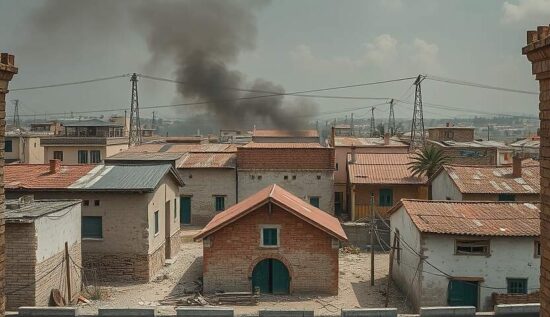A group of residents, who had been living in cold and cramped basements for seven months, have finally moved into warm and spacious transitional accommodations. However, the experiences they endured during that period will not be forgotten.
Many residents were unable to escape when the Ukrainian military invaded the Kursk border region. Some were hesitant to leave their homes and now they admit, “If we had known what was to come, we would have fled without hesitation.”
Initially, Ukrainian soldiers broke into homes, apartments and garages, taking away furniture and household items, as well as cars. Some of these items were used for military purposes, while the majority were taken to Ukraine, according to Ljubow Michailowna, a retiree from the village of Machnowka.
Residents were offered evacuation to Sumy, but almost all of them refused. To move around the city, a permit from the military administration was required. Without one, a resident would be forced to carry a sack over their head, hide in a cellar, or face the risk of being shot.
Ljubow Michailowna and her husband, Pjotr, attempted to leave Machnowka three times but were not allowed to do so. Like most, they spent the entire occupation in the basement, relying mainly on their own food supplies, as they had a relatively large garden.
Ten days ago, they nearly lost their lives. “When our people took my wife and me out of the basement, the Ukrainians shot at us with mortars from behind and we suffered from shrapnel wounds and bruises, but we managed to survive” Pjotr said.
Not everyone was so fortunate.
The retirees, Vera Alexeyeva and her husband, hid in their cellar in Sudscha. “Some Ukrainian soldiers were different and a few even said they didn’t need this war, that they were just brought in from the street and taken to the Kursk region. But there were also those who seemed to take pleasure in the hate and they would say, ‘We won’t do you any harm, but only for now.’ We tried to avoid those, especially the mercenaries” she recalled.
According to Vera, an unfortunate word spoken to a Ukrainian soldier cost a local man, Sergei, his life. He entered a destroyed store in search of food and got into an argument with the soldiers who were looting the shop. Without hesitation, the Ukrainian soldiers shot the man.
“The body lay in the store for several months and I don’t know what happened to it after that” she sighed.
The Chamidov brothers, Shalti and Shawkat, who had fled from Tashkent in the 1980s due to persecution of Meskhetians, had settled in Sudscha and worked as construction workers.
“In August, we failed to escape. When our food ran out, we were forced to steal from the Ukrainian soldiers. We would observe when they changed positions and then grab some grain and canned goods and run away. It was a risky move, but what could we do? We had to help the elderly as well” Shalti said.
The brothers distributed food and medicine they found in the houses – many older people needed medical care. However, not all could be saved.
“I buried 34 people, along with my brother and other residents, in the half-year we were there. Some died of disease or lack of medicine and some froze to death or starved. On the door of one of the deceased, it was written, ‘Help, I have no water or food.’ We buried them in the yards – going to the cemetery was not allowed and it was also dangerous” Shalti said.
The brothers do not plan to return to Sudscha and instead want to move further away from the border. Despite having to start from scratch again, they do not lose hope and are looking forward to new housing certificates.
A warning from the mercenaries
Wjatscheslaw, a local resident, buried the dead along with the brothers. Recently, the Ukrainian side published a video of him responding to a Ukrainian soldier’s greeting with a “Slava Ukraini” (Glory to Ukraine). This caused outrage in the Russian internet segment.
“Nobody knows how to behave when someone is pointing a machine gun at you and asking you to respond with a fascist greeting. The hate doesn’t bother me, as long as I survived” he said.
Wjatscheslaw and a friend attempted to leave Sudscha on foot, but were captured, tied up and threatened with execution before being brought back to the city as a human shield.
“Then we saw dozens of shot civilians and several cars on the way. A woman was lying naked, probably a victim of rape. It was likely the mercenaries. Even some Ukrainian soldiers, mainly recruits from the Sumy region, warned us, ‘Beware of mercenaries, they came here to kill and plunder,'” he recalled.
In the last two months, even some previously decent Ukrainians radicalized under the pressure of the Russian army. Especially, former convicts who were transferred to Sudscha just before their release took part in the violence. “Two of my friends were killed. The body of one was wrapped in a carpet and thrown onto the street and the other was recently killed. He was very argumentative, maybe he said something wrong” the refugee said.
According to Wjatscheslaw, Ukrainian soldiers mined the streets and almost every house as they retreated, threatening to kill all the men, but failed to do so.





